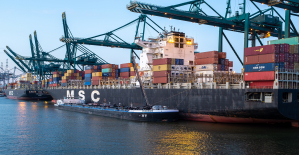The designation of new marine protected areas in the Southern Ocean, urgently demanded by nature conservationists and researchers, has failed again. The 41st conference of the Antarctic Commission CCAMLR in Hobart, Australia ended on Friday evening (local time) without the hoped-for breakthrough, the Antarctic and Arctic Ocean Association (ASOC) announced. There was also no agreement on stricter fishing measures. Conservationists are increasingly frustrated with the deadlock. Resolutions have failed for years due to resistance from Russia and China, including this year.
“The last almost untouched spots on our planet are in the Southern Ocean. These unique ecosystems are invaluable in the fight against the climate crisis," said Federal Minister of Agriculture Cem Özdemir (Greens) of the German Press Agency. For large protected areas it is therefore "five to twelve" - especially to preserve biodiversity.
"The long-standing Russian blockade shows once again that Russia is not interested in constructive cooperation with the international community," emphasized Özdemir. Moscow and Beijing are not concerned with scientific arguments, but only with the use of resources that are worth protecting.
In particular, there has been a struggle for years over three marine protected areas that would cover a total area of almost four million square kilometers - in East Antarctica, on the Antarctic Peninsula and in the species-rich Weddell Sea. 25 of the 27 members are in favor of the project. However, CCAMLR decisions must be unanimous.
Greenpeace ocean expert Franziska Saalmann spoke of a "severe but unfortunately foreseeable defeat for the protection of the oceans". With its failure, the commission is a full ten years behind on its self-imposed goal of setting up a network of protected areas. Decisions in protective bodies should not be made according to the principle of unanimity, she demanded.
Shortly before the start of the conference, the German Bundestag unanimously voted in favor of a marine protection area in the Weddell Sea. The protected area would be the largest marine protected area in the world. The Weddell Sea is the habitat and refuge for many species that have specialized in the harsh conditions in the icy habitat - such as hake, krill and emperor penguins. Since 2016, its designation as a protected area has been applied for regularly.
Protecting the Antarctic is about nothing less than preserving our livelihoods, said Daniel Schneider, a member of the SPD parliamentary group. “China and Russia will also have to be convinced of this – hopefully in the near future.”
At the meeting, no agreement was reached on the protection of the world's largest known breeding area for ice fish with around 60 million nests, Asoc continued. The breeding area was discovered earlier this year by scientists from the Alfred Wegener Institute, which coordinates polar research in Germany.
Another important topic of the CCAMLR meeting was the krill fishery. There was no breakthrough here either. Although the effects of krill fishing are now to be scientifically examined, stricter fishing measures have not been decided. Oil and fish feed are made from the tiny crustaceans.
But krill is also extremely important for the ecosystem and livelihood of whales, penguins and seals, for example. "Antarctic krill contributes to the global carbon cycle by storing millions of tons of carbon annually and is a key species in the Antarctic marine food web," said WWF researcher Emily Grilly.
One of the few pieces of good news is that CCAMLR has added eight new areas to the list of "Vulnerable Marine Ecosystems" (VME), the Asoc statement said. This means that fishing with gears that touch the seabed is not allowed in these areas. VMEs are seabed areas with species that are particularly vulnerable to disturbance, such as corals and sponges. Seven of the eight VMEs were only discovered earlier this year during a Greenpeace expedition to the Antarctic Peninsula.
The Convention for the Conservation of Antarctic Marine Living Resources (CCAMLR) was established in 1980. The commission consists of 26 states and the EU.
The World Wide Fund for Nature (WWF) and Greenpeace criticized the renewed failure to designate large marine protected areas. "It is tragic how the member states have been slowed down in their marine protection efforts for years by Russia and China, both of which fish in the region," said Tim Packeiser, marine protection expert at WWF Germany, in Hamburg. Greenpeace ocean expert Franziska Saalmann said in Hamburg: "This is a bitter but unfortunately foreseeable defeat for the protection of the oceans."
"With its failure, the commission is a full ten years behind its self-imposed goal of setting up a network of protected areas," said Saalmann. A "small consolation" is that eight smaller marine ecosystems are being protected. "In an area of 70 square kilometers, less than 0.1 percent of the required area, bottom fishing is excluded."
According to the WWF, as part of the climate crisis, the Southern Ocean is warming up even faster than other marine regions, and the finely balanced ecosystems have come under “massive pressure”. "Marine protected areas act as buffers against the climate crisis," Packeiser said. They strengthen the resilience of marine ecosystems and offer cold-dependent species an undisturbed haven. "The protection zones are becoming more urgent every year in order to preserve the unique biodiversity in the last almost untouched marine regions of our planet," says Packeiser.
The WWF described it as positive that the CCAMLR member states intend to take greater account of the consequences of climate change in their decisions in the future. Another ray of hope is that the states have agreed on a special meeting in April 2023, in which the proposed protected areas will be discussed again.

 Germany: abortions should be authorized up to 12 weeks, concludes a commission launched by Olaf Scholz
Germany: abortions should be authorized up to 12 weeks, concludes a commission launched by Olaf Scholz Knife attack in Australia: who are the two French heroes congratulated by Macron?
Knife attack in Australia: who are the two French heroes congratulated by Macron? Faced with an anxious Chinese student, Olaf Scholz assures that not everyone smokes cannabis in Germany
Faced with an anxious Chinese student, Olaf Scholz assures that not everyone smokes cannabis in Germany In the Solomon Islands, legislative elections crucial for security in the Pacific
In the Solomon Islands, legislative elections crucial for security in the Pacific Covid-19: everything you need to know about the new vaccination campaign which is starting
Covid-19: everything you need to know about the new vaccination campaign which is starting The best laptops of the moment boast artificial intelligence
The best laptops of the moment boast artificial intelligence Amazon invests 700 million in robotizing its warehouses in Europe
Amazon invests 700 million in robotizing its warehouses in Europe Inflation rises to 3.2% in March due to gasoline and electricity bills
Inflation rises to 3.2% in March due to gasoline and electricity bills Against drug trafficking, the mayor of Amsterdam advocates the regulation of cocaine
Against drug trafficking, the mayor of Amsterdam advocates the regulation of cocaine Hachette Livre removes Isabelle Saporta from management of Fayard
Hachette Livre removes Isabelle Saporta from management of Fayard Where is the MSC Aries, the ship boarded by Iran?
Where is the MSC Aries, the ship boarded by Iran? Denis Olivennes at Le Figaro: “CMI France discusses with Natacha Polony the future of Marianne”
Denis Olivennes at Le Figaro: “CMI France discusses with Natacha Polony the future of Marianne” 2024 Candidates Chess Tournament: Relive the Crucial Nepo-Gukesh Game
2024 Candidates Chess Tournament: Relive the Crucial Nepo-Gukesh Game Borgo, by Stéphane Demoustier: locked outside
Borgo, by Stéphane Demoustier: locked outside Release of hostages and immediate ceasefire: at the Venice Biennale, the Israeli pavilion resonates with Gaza
Release of hostages and immediate ceasefire: at the Venice Biennale, the Israeli pavilion resonates with Gaza Two Russian artists declared “terrorists and extremists” because of a play
Two Russian artists declared “terrorists and extremists” because of a play Skoda Kodiaq 2024: a 'beast' plug-in hybrid SUV
Skoda Kodiaq 2024: a 'beast' plug-in hybrid SUV Tesla launches a new Model Y with 600 km of autonomy at a "more accessible price"
Tesla launches a new Model Y with 600 km of autonomy at a "more accessible price" The 10 best-selling cars in March 2024 in Spain: sales fall due to Easter
The 10 best-selling cars in March 2024 in Spain: sales fall due to Easter A private jet company buys more than 100 flying cars
A private jet company buys more than 100 flying cars This is how housing prices have changed in Spain in the last decade
This is how housing prices have changed in Spain in the last decade The home mortgage firm drops 10% in January and interest soars to 3.46%
The home mortgage firm drops 10% in January and interest soars to 3.46% The jewel of the Rocío de Nagüeles urbanization: a dream villa in Marbella
The jewel of the Rocío de Nagüeles urbanization: a dream villa in Marbella Rental prices grow by 7.3% in February: where does it go up and where does it go down?
Rental prices grow by 7.3% in February: where does it go up and where does it go down? Europeans: the schedule of debates to follow between now and June 9
Europeans: the schedule of debates to follow between now and June 9 Europeans: “In France, there is a left and there is a right,” assures Bellamy
Europeans: “In France, there is a left and there is a right,” assures Bellamy During the night of the economy, the right points out the budgetary flaws of the macronie
During the night of the economy, the right points out the budgetary flaws of the macronie Europeans: Glucksmann denounces “Emmanuel Macron’s failure” in the face of Bardella’s success
Europeans: Glucksmann denounces “Emmanuel Macron’s failure” in the face of Bardella’s success These French cities that will boycott the World Cup in Qatar
These French cities that will boycott the World Cup in Qatar Bundesliga: Naby Keita suspended by Werder Bremen until the end of the season
Bundesliga: Naby Keita suspended by Werder Bremen until the end of the season Euro 2024: the Blues reveal their opponents for friendlies in June
Euro 2024: the Blues reveal their opponents for friendlies in June Cycling: De Marchi wins the 2nd stage of the Tour of the Alps
Cycling: De Marchi wins the 2nd stage of the Tour of the Alps Paris Olympics 2024: Joris Daudet (BMX) candidate to be French flag bearer
Paris Olympics 2024: Joris Daudet (BMX) candidate to be French flag bearer


















